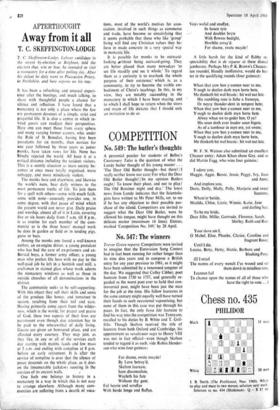Away from it all
AFTERTHOUGHT T. C. SKEFFINGTON-LODGE
T. C. Skeffington-Lodge, Labour candidate in the recent by-election at Brighton, told the electors that, win or lose, he intended to visit a monastery for a time after polling day. After his defeat he duly went to Pluscarden Priory, in Perthshire, and here reports on his stay.
It has been a refreshing and unusual experi- ence after the hustings, and much talking, to share with thoughtful people a chance for silence and reflection. I have found that a monastery is not only a place where the few are permanent devotees of a simple, strict and prayerful life. It is also a centre in which in- vited guests can readjust their perspectives. Here one can meet those from every sphere and many varying former careers, who, under the Rule of St Benedict, having first been postulants for six months, then novices for one year followed by three years as junior Monks, have taken vows for life. None has blindly rejected the world. All keep it at a critical distance including the resident visitors. This is a seemly situation as mass society be- comes at once more totally organised, more unhappy, and more mindlessly violent.
The monks here and elsewhere, and likewise the world's nuns, bear daily witness to the most permanent truths of life. To join them for a spell with others—some with much faith, some with none—assuredly provides one, in some degree, with that peace of mind which the present world can never give. Daily praise and worship, almost all of it in Latin, covering five or six hours daily from 5 a.m. till 8 p.m., is as routine for each member of the com- munity as is the three hours' manual work he does in garden or field or in tending pigs, geese or bees.
Among the monks one found a well-known author, an ex-engine driver, a young postulant who has had the care of ex-prisoners and ex- Borstal boys, a former army officer, a young man who prefers life here with no pay to the well-paid job he left in a Scottish steel mill, a craftsman in stained glass whose work adorns the monastery windows as well as those in outside churches of all denominations in the district.
The community seeks to be self-supporting. With this object they sell their skills and some of the produce like honey, and tomatoes-in season, resulting from their toil and care. Having primarily come apart from the wilder- ness. which is the world, for prayer and praise of God, these two aspects of their lives are paramount even though due attention has to be paid to the wherewithal of daily living. Guests are given an honoured place, and are afforded every courtesy. They may join, as they like, in any or all of the services each day starting with matins. lauds and low mass at 5 a.m. and ending with compline at 8 p.m. before an early retirement. It is after the service of compline is over twat the silence of peace descends on the whole place, as it does on the innumerable jackdaws roosting in The crevices of its ancient walls.
One feels one belongs to history in a monastery in a way in which this is not easy to arrange elsewhere. Although many com- munities are suffering from a dearth of voca-
tions, most of the world's motives for asso- ciation, involved in such things as commerce and trade, have become so unsatisfying that it seems probable that those who like 'group' living will find any Christian values they be- lieve in made concrete in a very special way in monastic life.
It is possible for monks to be outward- looking ,without being outward-going. They are better placed than many nowadays 'to see life steadily and see it whole.' To regard them as a curiosity is to overlook the whole purpose of their existence, which is, as a community, to try to become the visible em- bodiment of Christ's teachings. In this, in my view, they are notably succeeding in the monastery in which I have been staying, and to which I shall hope to return when the stress and strain of life dictates that I should seek an invitation to do so.










































 Previous page
Previous page